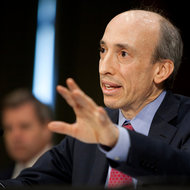 Joshua Roberts/Bloomberg NewsGary Gensler, chairman of the Commodity Futures Trading Commission, testifying at a Senate Agriculture Committee hearing.
Joshua Roberts/Bloomberg NewsGary Gensler, chairman of the Commodity Futures Trading Commission, testifying at a Senate Agriculture Committee hearing.
9:06 p.m. | Updated
Wall Street sought to deliver another blow to the financial regulatory overhaul on Friday, as two industry trade groups sued a federal regulator over a new rule restricting speculative trading.
The Securities Industry and Financial Markets Association and the International Swaps and Derivatives Association filed a lawsuit challenging the Commodity Futures Trading Commission’s so-called position limits rule.
The agency adopted the rule in October to cap the number of contracts a trader can hold on 28 commodities. The vote was an important step in the Obama administration’s effort to enforce the Dodd-Frank overhaul.
But in the complaint filed in federal court in the District of Columbia, Sifma and I.S.D.A. argue that the commission erred when it completed the rule, contending that it failed to evaluate the rule’s economic impact on Wall Street.
“The evidence is overwhelming that position limits are, at best, unnecessary and may, at worst, negatively impact commodity markets and users,” Conrad Voldstad, the I.S.D.A. chief executive, said in a statement. A joint statement by Mr. Voldstad and T. Timothy Ryan Jr., Sifma’s leader, called the rule “poorly crafted” and based on “an incorrect reading of the law.”
It is unclear what will be the next step in the legal battle. A spokesman for the commodities commission declined to comment though Congressional supporters of Dodd-Frank chided the industry groups for bringing the lawsuit. “The financial industry tried to water down Dodd-Frank before it was enacted, has been trying to chip away at it since it became law, and is continuing that effort with this lawsuit,” Carl Levin, Democrat of Michigan, said in a statement.
The lawsuit is the latest indication that Wall Street is shifting fronts in the battle over Dodd-Frank, moving from backroom lobbying to the courtroom. A federal appeals court in July struck down the Securities and Exchange Commission’s so-called proxy access rule, a Dodd-Frank policy that would have made it easier for shareholders to nominate company directors. The court ruled that the S.E.C.’s cost-benefit analysis on the rule was inadequate.
The decision incited fear among regulators, and even caused several agencies to re-examine their Dodd-Frank rules. The Commodity Futures Trading Commission, mindful of possible legal challenges, delayed voting on its position limits rule on multiple occasions. The agency also agreed to delay the enforcement of many new position limits for at least a year.
But Wall Street lobbyists say the rule did not improve with time. The I.S.D.A. and Sifma note that Dodd-Frank leaves it to regulators to enforce position limits only “as appropriate.” The groups pushed regulators to interpret the fine print to mean that in essence, no limits were appropriate.
Bart Chilton, a Democratic member of the agency who is the chief advocate of the position limits rule, aimed to rebut those claims earlier this year. Mr. Chilton, in a speech in September at a United Nations panel, argued that Wall Street was “trying to dance on the head of a legal pin.”
Still, the lawsuit filed Friday accused the agency of writing an inadequate cost-benefit analysis and not allowing the industry to adequately comment on the rule proposal. The commission was inundated with letters about the position limits plan — about 15,000 comments.
The rule’s supporters promote the rule as the nation’s best hope for protecting consumers from speculative commodities trading. Over the last few years, the financial industry has increased its speculation in the futures market. At the same time, the prices of the underlying commodities have fluctuated wildly, driving up energy costs and food prices. The rule would set limits on traders accumulating position in commodities, including energy products and metals, like oil and gold. Previously, the limits covered only nine agricultural commodities, including corn.
The decision to challenge the rule in the courts, while significant, is hardly surprising. Over the last year, several financial trade groups have issued thinly veiled threats of legal action. In March, the Futures Industry Association urged the commission to drop its position limits plan, saying it “may be legally infirm.”
When the commission voted on the rule in October, the agency was fiercely divided, with three Democratic commissioners voting for the crackdown and its two Republicans voting against it.
Financial industry groups’ lawsuit against the C.F.T.C.
Article source: http://feeds.nytimes.com/click.phdo?i=501480295d971a0e09ea3d55301a7f92
Speak Your Mind
You must be logged in to post a comment.